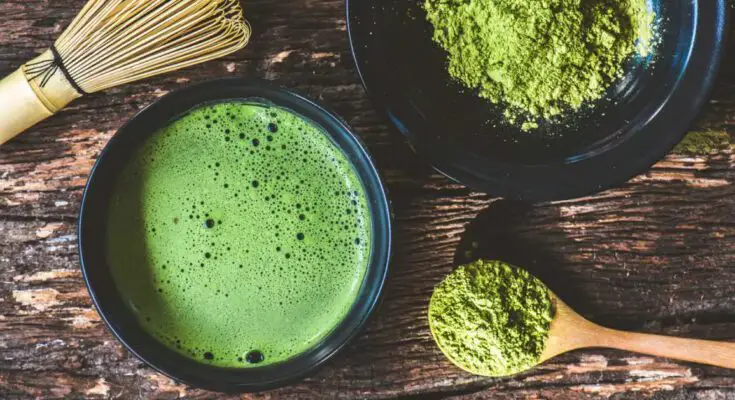In Japan, matcha tea has a strong cultural meaning that comes from spiritual practices and traditions that go back hundreds of years. Matcha was first made in China during the Tang Dynasty. In the 12th century, Buddhist monks took it to Japan, where it became an important part of Japanese culture. Getting matcha ready and drinking it are not just ways to drink tea; they are deeply rooted in Japanese history, religion, and social norms.
The most well-known way that matcha is important in Japanese culture is through the chanoyu or sado tea ceremony. This type of ceremony is an art form that shows peace, harmony, respect, and purity, which are all important ideas in Zen Buddhism. There are very specific steps for making, serving, and drinking matcha at the event. Traditional Japanese sweets are often served with the tea to balance out its bitter taste. Every move, from whisking the matcha to putting the utensils down, is done with careful grace and accuracy, which reflects a meditative awareness that is at the heart of the experience.
Matcha has spread to many other parts of Japanese culture and daily life besides the tea ceremony. It is an important part of Japanese cooking and is used in many meals, from sweets like mochi and wagashi to savoury ones. Matcha is a famous ingredient in modern Japanese food because of its bright green colour and unique flavour. It bridges the gap between traditional and modern culinary innovation.
Matcha is also an important part of Japanese health and wellness habits. People love the tea because it is good for them in many ways, such as having a lot of antioxidants, speeding up the metabolism, and possibly clearing the mind. People in Japan believe that drinking matcha every day is good for your mental and physical health. This is an example of the “holistic” approach to health that is common in Japanese society.
In addition to being used in cooking and for health reasons, matcha is also a part of many cultural traditions and festivals. As a sign of good luck and renewal, it is often served at traditional Japanese events like the New Year and parties where people watch cherry blossoms bloom (hanami). When people drink matcha together at these events, it creates a sense of community and shared experience, which strengthens social ties and cultural continuity.
In addition to its societal importance, matcha is also beautiful. Kintsugi, the art of fixing broken pottery with gold, and wabi-sabi, the philosophy of finding beauty in flaws, are both very similar to the ideals of the tea ceremony. The ceremony’s simple but beautiful tea bowls and other tools are often made by skilled artists who give each piece a sense of history and artistic expression.
In conclusion, in Japan, matcha tea is more than just a drink; it’s an important part of the country’s past, spirituality, and sense of beauty. Matcha has been important for a long time. It is prepared and drunk in a ritual way during the tea ceremony, and it is also used in everyday life and for health reasons and during holidays. Matcha is a link between the past and the present. It helps people remember their cultural roots while also adapting to modern life.
How making matcha tea affects the environment
The process of making matcha tea has a variety of effects on the climate that depend on the farming methods and production methods used. As the demand for matcha grows around the world, it’s important to understand these effects in order to encourage environmentally friendly practices and keep environmental damage to a minimum.
The intense farming methods that are often used to grow the tea plants are one of the main environmental problems that come up with making matcha tea. Synthetic fertilisers, pesticides, and herbicides are often used in conventional matcha farming to get the most out of the plants and keep them safe from diseases and bugs. These chemicals can get into the water and land, polluting them and upsetting the ecosystems in the area. The runoff can hurt marine life and make drinking water unsafe, which is bad for both people and the environment.
Organic matcha farming, on the other hand, doesn’t use man-made chemicals. Instead, it uses natural ways to keep the land healthy and get rid of pests. An important way that organic farms improve the health and variety of their soil is by using cover crops, compost, and crop rotation. These steps can make the environment more stable, stop soil erosion, and lower the amount of carbon dioxide that is released when tea is grown. But organic growing usually needs more work and can lead to lower yields, which could change how much organic matcha costs and how easy it is to find.
Making matcha takes a lot of energy, which is another big environmental problem. In traditional methods, the tea plants are shaded for a few weeks before they are picked to increase the green content and improve the flavour. For this method of shading to work, special coverings must be built and kept up. If these coverings are not handled sustainably, they can add to the use of resources and waste. The leaves are picked, cooked, dried, and then ground into a fine powder on stones. While stone grinding makes high-quality matcha, it takes a long time and a lot of energy. The types of energy used in this process have a big effect on how it affects the world as a whole. Renewable energy sources are better for the environment.
Another important part of making matcha tea is using water. A lot of water is needed for tea plants, and irrigation can put a pressure on local water supplies, especially in places where water is scarce. Sustainable ways of managing water, like collecting rainwater and using smart watering systems, are needed to lower the amount of water used in matcha production.
In addition, the way matcha tea is packed and shipped leaves an impact on the earth. Matcha is usually stored in airtight cases to keep it fresh and stop it from going bad. Making and getting rid of these packing materials can create a lot of waste, especially if they can’t be recycled or broken down naturally. Transportation emissions are also a part of the global spread of matcha tea, especially when it is sent from Japan to other parts of the world. Using eco-friendly packing materials and finding the best ways to ship things can help lessen these effects.
What people choose to drink also affects how matcha tea affects the world. People can support farming methods that are better for the earth by choosing organic matcha. Supporting brands that care about the environment, like those that use eco-friendly packaging and green energy in their production, can also help change things for the better in the industry.
In conclusion, the production of matcha tea has many effects on the world, such as farming methods, energy use, water management, packaging, and transportation. There are some environmental problems with conventional matcha growing, but organic and sustainable methods can help lessen these effects. Both producers and consumers can help make the matcha tea business more sustainable by making smart choices. This way, this popular drink can be enjoyed without hurting the health of our planet.
Using matcha tea to get rid of toxins naturally
Not only is matcha tea praised for its unique taste and cultural importance, but it may also be good for you, especially because it can help your body detox. People use matcha tea to naturally clean themselves because it has a lot of vitamins, chlorophyll, and other good chemicals that help the body’s natural cleaning processes.
One of the most powerful cleansing substances in matcha is chlorophyll, which is the green pigment that gives it its bright colour. People know that chlorophyll can bind to heavy metals and other toxins in the body and help get rid of them. This process cleans the liver, which is the main organ in the body that gets rid of toxins, and can make it work better overall. Matcha helps the body’s natural detoxification systems work better by making it easier for the liver to clear out and get rid of toxins.
You can also find a lot of vitamins in matcha, especially flavonoids called catechins. Epigallocatechin gallate (EGCG), which has been studied a lot for its health effects, is the most powerful catechin in matcha. Antioxidants, such as EGCG, fight oxidative stress by getting rid of free radicals, which are unstable molecules that can harm cells. Matcha helps protect the body from chronic inflammation and diseases like cancer and heart disease that are linked to toxin buildup by lowering reactive stress.
In addition to being an antioxidant, matcha has a small amount of caffeine in it, which is a natural stimulant that can speed up the metabolism. Matcha has both caffeine and the amino acid L-theanine, which together give you a calm, focused energy boost without the jitteriness that comes with drinking other caffeinated drinks. This steady energy can improve physical performance and help the body get rid of toxins by making you more active and speeding up your metabolism.
In addition, the fibre in matcha helps the body get rid of toxins by keeping the digestive system healthy. Fibre in the diet helps keep bowel movements regular, which makes sure that waste and toxins are properly removed from the digestive system. Regularly drinking matcha can help keep your gut healthy, which is important for detoxing and general health.
The way matcha is made also adds to its cleansing properties. In regular green tea, the leaves are soaked and then thrown away. But with matcha, you eat the whole tea leaf in powder form. This means you’re taking in a bigger concentration of nutrients and good chemicals, which makes it work better at detoxifying.
A simple and effective way to help your body naturally clean is to add matcha to your daily routine. It can be drunk in many ways, like as regular tea, matcha lattes, smoothies, or even as an ingredient in healthy meals. It is best to choose high-quality, organic matcha so that you don’t have to worry about pesticides and other harmful chemicals.
In conclusion, matcha tea is a strong natural detoxifier because it has a lot of chlorophyll, which is an antioxidant, and other good compounds that help the liver work, fight oxidative stress, speed up the metabolism, and improve digestive health. Adding matcha to your diet can help your general health and well-being by detoxifying your body. This makes it a great addition to a holistic lifestyle.



